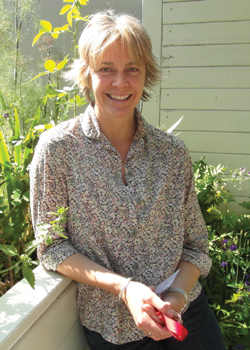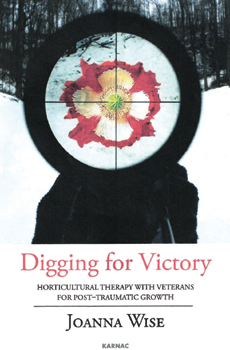|
DIGGING FOR VICTORY
HORTICULTURAL THERAPY WITH VETERANS
AN INTERVIEW WITH THE AUTHOR - JOANNA WISE
by Paul de Zulueta
formerly Welsh Guards
|

Joanna Wise
|
‘And they shall bend their swords into ploughshares, and their spears into pruning hooks’. (Micah, Chapter IV, verse 3)
Although close to 50 years have passed, I remember him well. He used to kneel outside our prep school chapel holding a wooden rosary. He looked shabby, careworn and had a pronounced nervous tic. He never once came into chapel but, after the service, would make his way to the school gardens where he would spend the rest of the day digging and weeding. We never sought to ask who he was, though I remember our geography master, Mr McBean, telling us: ‘Don’t worry boys about old Ollie, he’s had shell shock, he likes helping with our gardens, does us both the power of good’.
As I look back now, I think Mr McBean and Ollie understood each other well enough. Towards the end of each term, Mr McBean would dress in the dark tartan of the Black Watch, with whom he had fought in North Africa, and treat us to a display of Bren gun drills using the classroom broomstick. As he got into the swing of it, he would work himself up into a frenzy, grasping the broomstick for a bayonet charge, his eyes ablaze, as he bellowed ‘Nemo me impune lacessit’- ‘no-one provokes me with impunity’, the Black Watch motto.
Before I met Joanna to talk about her book, Digging for Victory, she sent me her PR flyer. I lost hope in the first paragraph with sentences that read: ‘targeting specific client-centred goals … learning valuable skill sets, … community focused practice, … gender sensitive treatments’. I braced myself for a meeting with a dry as a stick academic, flat sensible shoes, no make-up, hair scraped back and no hint of frivolity. I was wrong on all counts except for the make-up, for Joanna had no need, her complexion fresh as an apple, her bearing calm, unruffled and easy on the eye.
‘I rather agree with you, Paul,’ she said, a wintry smile passing across her face, ‘the flyer is stodgy stuff but remember I am doing my doctorate, and that’s the way we are expected to talk and write.’ Joanna’s CV was certainly impressive: a First in Psychology at Birkbeck; several years as a research psychologist specialising in Cognitive Analytical Therapy at Guy’s Hospital; and now a qualified horticultural therapist which included a fulfilling stint working for ‘Gardening Leave’ at the Royal Hospital Chelsea with veterans suffering from Post-Traumatic Stress Disorder (PTSD). Like Anna Baker Cresswell, founder and development director of High Ground, and Imogen Gordon from Coventry University, Joanna is just one of several remarkable and thoughtful women who see horticultural therapy as one way of healing injured veterans.
I asked Joanna about the two key themes in her book of ‘recalibration’ and ‘growth’ as it struck me that these two words were central to what she and her colleagues wanted to achieve. ‘That’s right … recalibration really resonates with veterans, they respond to a natural environment like a garden, it’s safe and calm and frees them up, allowing them to adjust and to be still again. I’m afraid there’s still quite a lot of mistrust amongst some veterans about the NHS, whether they really understand what veterans go through.’
Joanna reminded me that horticultural therapy had firm foundations in occupational therapy. ‘And growth,’ she went on, ‘as Nietzsche said: “What doesn’t kill us makes us stronger.” It’s all rooted in the positive psychology movement. Some experts think that if you try to suppress typical PTSD symptoms with conventional treatments, you are simply pathologising what is a normal process of recovery. They have a point but I believe that post-traumatic growth, which is why I have used that phrase in the book’s title, has to address an injured veteran’s physical, psychological, social and spiritual development, the person as a whole.’
Joanna was now hitting her stride, and I could not help but be impressed by her passion and her way of getting me to think differently. ‘Here’s the thing,’ she said. ‘Just think about the term PTSD, the word “disorder”, such a negative term. It’s not a disorder, just a perfectly normal response. As Victor Frankl, the neurologist, psychiatrist and holocaust survivor, once memorably said: “An abnormal reaction to an abnormal situation is normal behaviour.”’
I mentioned a conversation I’d had with Dr Hugh Milroy, Chief Executive of Veterans Aid, who, along with Sir Max Hastings, felt that many veterans’ charities - now over 350 registered - were doing more harm than good and that there was a need for proper regulation. As Hugh Milroy said to me: ‘Paul, it’s become an industry driven by marketeers not need and, despite what the Press say, only three per cent of those sleeping rough are ex-services’. Joanna responded by saying that alcohol abuse among ex-services was higher than the population as a whole but drug and substance abuse much less. ‘That’s probably a cultural issue within the services.’
‘The USA can’t be too dissimilar to us’, she added, ‘the suicide rate is 25 per 100,000 for the population; around 18 per 100,000 for navy and air force veterans; and about 30 per 100,000 for army veterans’. I mentioned a recent article in the Daily Mail saying that more soldiers had killed themselves since the Falklands War than had been killed during the conflict. She smiled weakly saying ‘Ah yes, the Daily Mail, it’s not something I tend to read,’ adding ‘It takes around 14 years for a veteran to come and see, say, Combat Stress, but that’s likely to come down a lot post-Afghanistan. And remember a lot happens in those 14 years; lives unravel, they can’t hold down a job, families break up, they lose contact with friends. Frankly, we don’t know enough yet and the MOD is not exactly forthcoming, but Combat Stress is currently helping 5,600 veterans with mental health problems’.
It was time for a little neuroscience. Joanna explained that traumatic events experienced in combat can lead to a state of hypervigilance whereby a veteran can be on almost permanent alert for danger or sensation seeking. Joanna went on to say that this happens when the amygdala, the almond shape set of neurons located deep in the brain which process emotions, triggers a ‘fight or flight’ response. ‘So the auditory memory of a gunshot,’ she said, ‘will generalise to a short, sharp noise such as a slammed door, or a car backfiring.’ I thought of my close friend, Michael from the Parachute Regiment, who witnessed the Warrenpoint massacre which killed 18 soldiers in August 1979, and, to this day, finds it unbearable to travel behind a lorry with hay bales, because this was where the 800lb bomb had been placed.
I was beginning to get it. ‘So, in a sense, it’s similar to Cognitive Behavioural Therapy (CBT),’ I said ‘but in trying to recalibrate the way a veteran might think, feel and behave, it’s so much better to be out of a soulless clinic and the traditional talking therapies, and into a natural environment like a garden.’ ‘That’s right,’ she smiled, ‘it’s now known by psychologists as “soft fascination”, nature brings with it a breathing space, it lowers anxiety, it’s safe and calm and yet it allows veterans to be together with people they trust, perhaps growing things they can sell so they feel they are contributing once again to society. Nature heals itself, look at the decay now as we approach the dead of winter. And yet in the spring, regeneration.’
But soldiers like discipline, structure and order, I ventured as I thought about my own talent for staring out of the window unless supervised. She smiled and said that I was right. ‘Each horticultural therapy programme had “flow”, clear goals and objectives, direct feedback, the right balance between ability and challenge with supportive and qualified therapists who think and act like gardeners and are not trying to diagnose and fix the patient’s problem.’ ‘And you’ll like this’, she added. ‘Veterans really get a lot out of bird watching, they find it enjoyable and therapeutic, reminds them of vehicle recognition training, they like that link to their past, it’s a bridge for them.’
I asked Joanna what the establishment, government and the NHS thought of all this, as giving it the thumbs-up would lead to formal recognition and funding. She sighed, remarking that the NHS was under huge budgetary pressure to make savings and produce measurable outcomes. But she brightened as she said, ‘That’s why we are working so hard to validate horticultural therapy so that people see it as an evidence-based, effective and cost-effective treatment. I am convinced that veterans who complete a horticultural therapy programme will find, once again, a sense of self-worth, a successful transition to civilian life, meaningful work and a good social life. Post-traumatic growth - that’s the message I want to leave people with.’
It was a message echoed on the last page of Joanna’s book by a veteran who wrote ‘I loved the slow deliberate pace of it all. The rewards of growing food, flowers, plants cannot be overstated; the mental health benefits are immeasurable, and the social contribution yet to be realised. It may well be the case that people reaching the end of life look for an answer in God; others take to nature and in particular gardening.’
Later that day, there was an article in The Times about the former Poet Laureate, Andrew Motion’s Equal Voices, a choral work to mark the outbreak of the First World War. I felt goose bumps as I read a quote from a veteran who had suffered shell shock at the Somme: ‘I am in urgent need of outdoor work and would be glad to accept a position as under gardener at a nominal salary’.
Digging for Victory is available from Karnac Books. www.karnacbooks.com 020 7431 1075
 |
|
|


